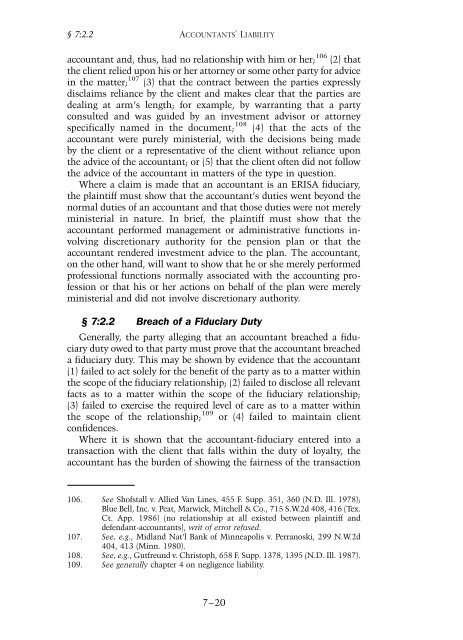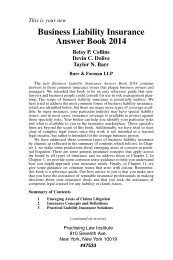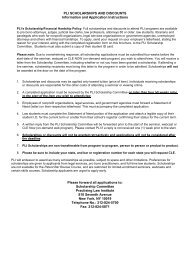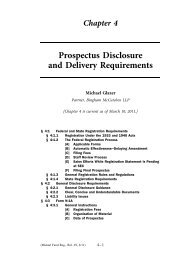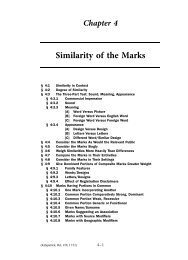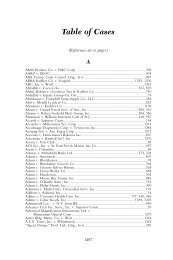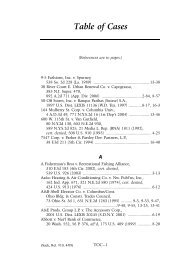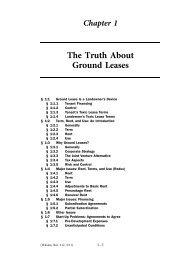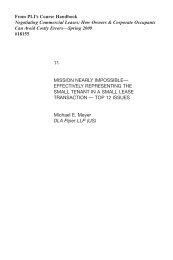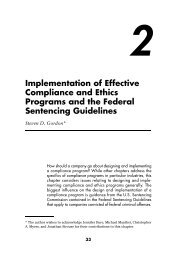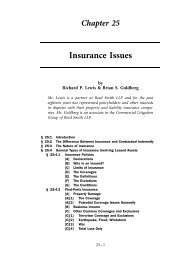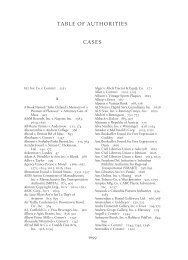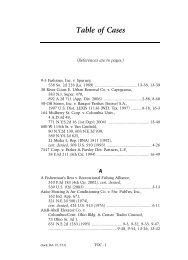Breach of Fiduciary Duty
Breach of Fiduciary Duty
Breach of Fiduciary Duty
Create successful ePaper yourself
Turn your PDF publications into a flip-book with our unique Google optimized e-Paper software.
§ 7:2.2 ACCOUNTANTS’ LIABILITY<br />
accountant and, thus, had no relationship with him or her; 106 (2) that<br />
the client relied upon his or her attorney or some other party for advice<br />
in the matter; 107 (3) that the contract between the parties expressly<br />
disclaims reliance by the client and makes clear that the parties are<br />
dealing at arm’s length; for example, by warranting that a party<br />
consulted and was guided by an investment advisor or attorney<br />
specifically named in the document; 108 (4) that the acts <strong>of</strong> the<br />
accountant were purely ministerial, with the decisions being made<br />
by the client or a representative <strong>of</strong> the client without reliance upon<br />
the advice <strong>of</strong> the accountant; or (5) that the client <strong>of</strong>ten did not follow<br />
the advice <strong>of</strong> the accountant in matters <strong>of</strong> the type in question.<br />
Where a claim is made that an accountant is an ERISA fiduciary,<br />
the plaintiff must show that the accountant’s duties went beyond the<br />
normal duties <strong>of</strong> an accountant and that those duties were not merely<br />
ministerial in nature. In brief, the plaintiff must show that the<br />
accountant performed management or administrative functions involving<br />
discretionary authority for the pension plan or that the<br />
accountant rendered investment advice to the plan. The accountant,<br />
on the other hand, will want to show that he or she merely performed<br />
pr<strong>of</strong>essional functions normally associated with the accounting pr<strong>of</strong>ession<br />
or that his or her actions on behalf <strong>of</strong> the plan were merely<br />
ministerial and did not involve discretionary authority.<br />
§ 7:2.2 <strong>Breach</strong> <strong>of</strong> a <strong>Fiduciary</strong> <strong>Duty</strong><br />
Generally, the party alleging that an accountant breached a fiduciary<br />
duty owed to that party must prove that the accountant breached<br />
a fiduciary duty. This may be shown by evidence that the accountant<br />
(1) failed to act solely for the benefit <strong>of</strong> the party as to a matter within<br />
the scope <strong>of</strong> the fiduciary relationship; (2) failed to disclose all relevant<br />
facts as to a matter within the scope <strong>of</strong> the fiduciary relationship;<br />
(3) failed to exercise the required level <strong>of</strong> care as to a matter within<br />
the scope <strong>of</strong> the relationship; 109 or (4) failed to maintain client<br />
confidences.<br />
Where it is shown that the accountant-fiduciary entered into a<br />
transaction with the client that falls within the duty <strong>of</strong> loyalty, the<br />
accountant has the burden <strong>of</strong> showing the fairness <strong>of</strong> the transaction<br />
106. See Sh<strong>of</strong>stall v. Allied Van Lines, 455 F. Supp. 351, 360 (N.D. Ill. 1978);<br />
Blue Bell, Inc. v. Peat, Marwick, Mitchell & Co., 715 S.W.2d 408, 416 (Tex.<br />
Ct. App. 1986) (no relationship at all existed between plaintiff and<br />
defendant-accountants), writ <strong>of</strong> error refused.<br />
107. See, e.g., Midland Nat’l Bank <strong>of</strong> Minneapolis v. Perranoski, 299 N.W.2d<br />
404, 413 (Minn. 1980).<br />
108. See, e.g., Gutfreund v. Christoph, 658 F. Supp. 1378, 1395 (N.D. Ill. 1987).<br />
109. See generally chapter 4 on negligence liability.<br />
7–20


